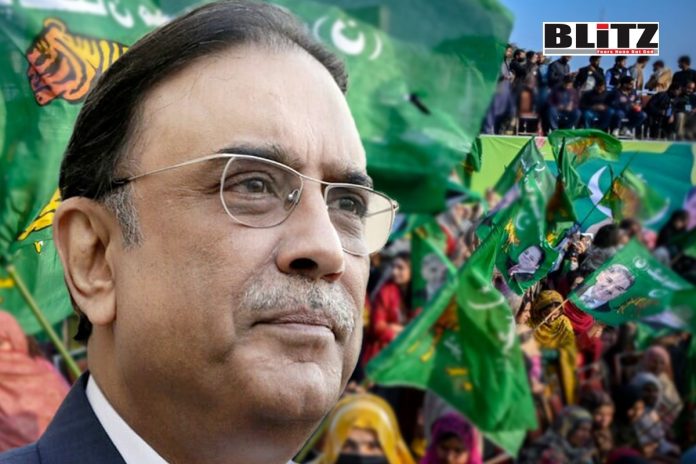Amid acute economic crisis and direct intervention of military-intelligence establishments in recently held election, Pakistan is all set for getting a new government headed by Asif Ali Zardari of Pakistan Peoples Party (PPP) – a notoriously corrupt individual known as “Mr. 10 percent” and Shehbaz Sharif of Pakistan Muslim League Nawaz (PML-N) as prime minister.
Commenting on February 8 election, Pakistan Today in an opinion editorial said: “The twelfth general elections, held on February 8, have created an atmosphere of uncertainty and distrust. A very famous quote which is commonly attributed to Mark Twain, “History does not repeat itself but it often rhymes”, can be well-applied to the situation of each general election in Pakistan. The circumstances and settings may have been different, but the same phenomena occur repeatedly. As written by the former Pakistan Tehreek-e-Insaf (PTI) chairman, in an article for The Economist, “Pakistan’s Election Could Be a Farce”, validates the current situation. The footprints of external forces persuading the outcome of the people’s mandate are no longer covert from the eyes of the world”.
Zara Maqbool in an article in The Nation wrote, “I don’t have anything to add to what has happened in the elections in 2024. We are all once again witnessing the law of the jungle and once again we feel hopeless and defeated and awaiting our fate of more instability and state chaos than ever before. The reality is that we are a traumatized nation. We feel helpless and disempowered and this collective trauma where holding a Pakistani passport means, we will continue to drown in this corrupt country where a few mighty and strong setups will do as they please for their vested interests and we can’t do anything that holds any potential for things to change.
“I can smell the trauma and pain in the air. I see it on people’s faces. I hear it in their voices. It’s trickling down to personal lives where the helplessness to the state and its unethical and unjust ways have started to affect the mental health of individuals and affecting their lives. There is anger and frustration and immense sadness and we are all triggered all the time and deflecting our pain onto our loved ones”.
Meanwhile commenting on rising popularity of Pakistan Tehreek-e-Insaf (PTI) party chief Imran Khan, The Dawn in an op-ed said, “There is no denying that a powerful support is surging behind Imran Khan today. There is no sense, and no sanity, in denying this.
“All predictions that the sun will soon set on Khan once he is removed from power are proving wrong. Just as things begin to look bad for him, something comes along to recharge his strength”.
Pakistan’s president Asif Zardai – the thief of Sindh
Asif Zardari is famously known as “Mr. Ten percent” in the Pakistan’s political landscape, as he is alleged to demand 10 percent as kickbacks for the government contracts. When Benazir Bhutto’s government was dismissed by President Ghulam Ishaq Khan in 1990, Asif Ali Zardari was widely criticized for involvement in corruption scandals that led to the collapse. In Benazir Bhutto’s government, her husband Zardari served as Federal Investment Minister and Chairperson of Pakistan Environment Protection Council. Following increasing tensions between Benazir’s brother Murtaza Bhutto and Asif Zardari, Murtaza was killed by police in Karachi on September 20, 1996, where Zardari was arrested and indicted for Murtaza’s murder as well as corruption charges.
A major report was published in January 1998 by The New York Times detailing Zardari’s vast corruption and misuse of public funds. The report discussed US$200 million in kickbacks to Zardari and a Pakistani partner for a US$4 billion contract with French military contractor Dassault Aviation, in a deal that fell apart only when the Benazir Bhutto government was dismissed. It contained details of two payments of US$5 million each by a gold bullion dealer in return for a monopoly on gold imports. It had information from Pakistani investigators that the Bhutto family had allegedly accrued more than US$1.5 billion in illicit profits through kickbacks in virtually every sphere of government activity. It also reported Zardari’s mid-1990s spending spree, which included hundreds of thousands of dollars spent on jewellery. The arrangements made by the Bhutto family for their wealth relied on Western property companies, Western lawyers, and a network of Western friends. The report described how Zardari had arranged secret contracts, painstaking negotiations, and the dismissal of anyone who objected to his dealings.
For Pakistan, a country which is heading towards bankruptcy – having a proven thief and notoriously corrupt Asif Ali Zardari as the president is not only a huge blunder – it would further deepen country’s crises and tarnish image globally.
But the silver lining in this case is – all of the previous governments, where Asif Ali Zardari was a part had collapsed prematurely at the intervention of mighty figures in Islamabad. This time too, Pakistan’s new coalition government of PML-N and PPP may collapse in less than a year, PTI leader Imran Khan’s popularity shall continue to grow. Pakistan may witness another political setback possibly by the end of this year.




